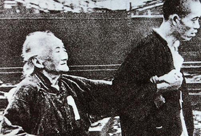BEIJING, March 6 -- China's target for economic growth this year is consistent with market expectations and shows its determination to boost reforms and re-balance the economy, experts said.
In a government work report delivered Wednesday at the annual session of the National People's Congress, the country's top legislature, Premier Li Keqiang said China keeps its economic growth target unchanged at around 7.5 percent as the government looks to achieve stable growth while driving through reforms for a more balanced model.
"On the basis of careful comparison and repeatedly weighing various factors as well as considering what is needed and what is possible, we set a growth target of around 7.5 percent," he said.
This is the third consecutive year the Chinese government has put the goal at 7.5 percent, a moderately high-speed growth after years of rapid development.
David Denoon, director of the Center on U.S.-China Relations at New York University, told Xinhua that a lower target would make growth more sustainable.
"Lower growth target is necessary adjustment," he said, adding that a growth rate at this level is very satisfactory.
Denoon's view coincides with Chinese leaders' new economic concept, which focuses on quality improvement and increase of efficiency.
Li said in November that China should find a "golden balancing point" for a fair economy that is both stable and sustainable.
In the government work report, he also vowed to keep inflation at around 3.5 percent, create more than 10 million urban jobs to ensure the registered urban unemployment rate will not rise above 4.6 percent, and increase total foreign trade by 7.5 percent.
Moreover, China's broad money supply (M2) is forecast to grow by around 13 percent, the same as last year's projection, Li said, adding that the deficit rate, namely the ratio of deficit over GDP, will be kept at 2.1 percent, fractionally higher than the 2-percent target for 2013.
Experts said he outlined a "reasonable range" again for China's economic development, making clear that the government will not excessively interfere in or stimulate the economy if it runs within a proper range.
Foreign media also noticed that Li pledged to further China's efforts in building a streamlined government administration by exempting more items from central government approval.
Reform is the top priority for government work this year, he said, adding that a deepened reform of its administrative system is a "revolution the government imposes on itself."
Li said China will vigorously develop a mixed-ownership economy and deepen fiscal and taxation reforms to better serve the real economy.
Experts said that as private enterprises often complain they are not on an equal footing when competing with state-owned companies that enjoy more benefits, reform of state-owned enterprises will accelerate the introduction of private capital, break monopolies and improve the pricing system.
Nicholas Lardy, a senior fellow at the Washington-based Peterson Institute for International Economics, said the reform will increase competition.
"It does lay out a significant role for non-state firms. It says they should be supportive, and they should have a level playing field... So I think one of the messages is that there may be more competition for incumbent firms, particularly state-owned firms," he said.
Meanwhile, experts said giving prominence to the market will also help tackle industrial overcapacity and transform the current growth model.
Stephen Perry, a seasoned British entrepreneur and China watcher, stressed the importance of allowing the market a greater role, saying it is necessary for the government to find a balance between freedom to develop and control.
"Allowing the market a greater role is clearly happening," said Perry, who is also chairman of the 48 Group Club, an independent business network committed to promoting relations between Britain and China.

 Chaihe village, pure and peaceful fairyland in snow
Chaihe village, pure and peaceful fairyland in snow Belgians warmly welcome arrival of China's giant pandas
Belgians warmly welcome arrival of China's giant pandas Female marines receive tactical training in NW China
Female marines receive tactical training in NW China Blood memory: Nanjing Massacre in 1937
Blood memory: Nanjing Massacre in 1937 Top 10 pure beauties in showbiz
Top 10 pure beauties in showbiz British WWII veteran: I can't forgive Japan
British WWII veteran: I can't forgive Japan Tongban's dream of prosperity
Tongban's dream of prosperity Chinese frigate Yancheng holds drills in Mediterranean Sea
Chinese frigate Yancheng holds drills in Mediterranean Sea A visit to comfort woman's home in South Korea
A visit to comfort woman's home in South Korea Fairyland? Qingdao in sea of clouds
Fairyland? Qingdao in sea of clouds Top 10 most handsome faces in Asia in 2013
Top 10 most handsome faces in Asia in 2013 Female celebs with beautiful long legs
Female celebs with beautiful long legs Cat 'guardians' in Forbidden City
Cat 'guardians' in Forbidden City Large numbers of ancient coins excavated in Inner Mongolia
Large numbers of ancient coins excavated in Inner Mongolia Leisurely life beneath Zhonggulou, where time travels slower
Leisurely life beneath Zhonggulou, where time travels slowerDay|Week|Month